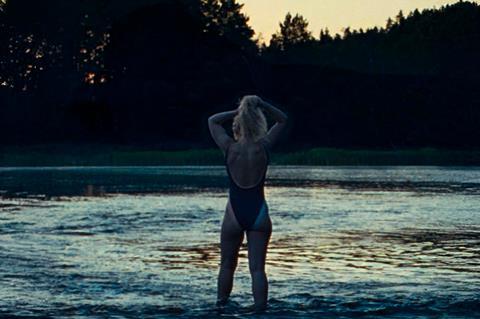Length and repetition undermines a fiery film anchored by Imogen Poots

Dir: Kristen Stewart. France/Latvia/US. 2025. 128mins
Some artists live with demons, and Kristen Stewart’s feature directorial debut dives deep into those that affected Lidia Yuknavitch, an American author who battled addiction after a childhood in which her father sexually abused her. The Chronology Of Water is a delicate biopic starring Imogen Poots as Yuknavitch over a series of years and an often fraught road to contentment. Despite an honourable commitment to exploring how severe adolescent trauma casts a long shadow over a person’s life, the film’s patina of pain eventually grows repetitive, undercutting the sensitivity Stewart and her lead bring to the proceedings.
Imogen Poots has never been as ferocious or as wounded
This Un Certain Regard selection will be of interest to Stewart’s fans, and it’s clear that the picture radiates the same intense, unguarded honesty as her own performances. Stewart doesn’t appear in the film, but Poots’ raw portrayal should help burnish attention for the film.
Shot on 16mm, the corners of the frame rounded off and sometimes jagged, like faded home movies, The Chronology Of Water (named after Yuknavitch’s 2011 memoir) looks at Yuknavitch (Poots) across five chapters. Growing up with her loving older sister Claudia (Thora Birch), she is intimidated by her dad Mike (Michael Epp), a distant, angry figure. (The film only gradually hints at the sexual abuse Yuknavitch endured until she, at last, admits to it as an adult.) Initially drawn to swimming, Yuknavitch eventually finds that writing is the ideal outlet to channel her anguish, although substance abuse and a string of bad romantic relationships threaten to keep her from ever finding a metaphorical escape from her crippling childhood.
Stewart’s 2017 short film Come Swim also screened in Cannes, and once again she focuses on how individuals can in part navigate their trauma through a submersion in water. The Chronology Of Water views Yuknavitch (who turns 62 next month) as an artist discovering herself, so much so that Stewart chooses to have Poots play the character even in adolescence. The gambit helps suggest the childhood baggage we carry around in adulthood, and Poots brings a vulnerability to Yuknavitch in those early scenes.
Corey C. Waters’ 16mm imagery further underlines this earnest project’s sense of intimacy and fragility, as does the frequent voiceover of Yuknavitch’s confessional, poetic musings. Olivia Neergaard-Holm edits The Chronology Of Water so that the character’s past and present sometimes intertwine, resulting in an elliptical style meant to evoke the fleeting but potent force of memory. The film exists in a dreamlike space, except the reminiscences are often bittersweet ones as Yuknavitch consumes drugs and experiences other tragedy, including a stillbirth.
Poots has never been as ferocious or as wounded, hinting at both Yuknavitch’s fiery artistry and her self-destructive tendencies. Because Stewart’s screenplay moves from incident to incident, creating an episodic swirl to her subject’s life, Poots must root each phase of the character’s existence in a vivid present tense, which she handles with aplomb. Unfortunately, too many of those phases start to blur together thematically, whether she’s meeting writing hero Ken Kesey (a jocular Jim Belushi) or reconnecting with her sister in adulthood. Individual moments can be affecting, but The Chronology Of Water crafts too many of the same kind of affecting moments. As a result, the film can make Yuknavitch’s journey to sobriety seem tedious, rather than an unpredictable, often heartbreaking saga of one step forward and two steps back.
As a director, Stewart has a keen eye for the immediacy of everyday life. And as The Chronology Of Water reaches its hopeful conclusion, the director produces some of her finest sequences, including one in which Yuknavitch’s father returns to her orbit, proving to be a much different man than in her youth. (Epp plays Mike as the prototypical unemotionally unavailable patriarch.) And Charlie Carrick is lovely as Andy, the man who finally comes along to be an equal partner to the searching, passionate Yuknavitch. The film may dwell too long in the dark waters of her life, but the ending argues that, for Yuknavitch at least, it was worth it to finally find solid ground.
Production companies: Scott Free, CG Cinema International, Forma Pro Films, Nevermind Pictures
International sales: Les Films du Losange, a.lesort@filmsdulosange.fr, US sales: WME, Deb McIntosh, dmcintosh@wmeagency.com
Producers: Michael Pruss, Rebecca Feuer, Charles Gillibert, Yulia Zayceva, Max Pavlov, Svetlana Punte, Maggie McLean, Kristen Stewart, Dylan Meyer, Andy Mingo
Screenplay: Kristen Steward, from the autobiography of the same name by Lidia Yuknavitch
Cinematography: Corey C. Waters
Production design: Jennifer Dunlap
Editing: Olivia Neergaard-Holm
Music: Paris Hurley
Main cast: Imogen Poots, Thora Birch, Susannah Flood, Tom Sturridge, Kim Gordon, Michael Epp, Jum Belushi, Charlie Carrick
















![[L-R]: Amanda Villavieja, Laia Casanovas, Yasmina Praderas](https://d1nslcd7m2225b.cloudfront.net/Pictures/274x183/6/4/1/1471641_pxl_20251224_103354743_618426_crop.jpg)







